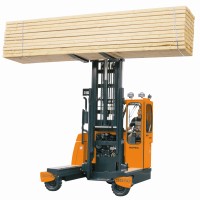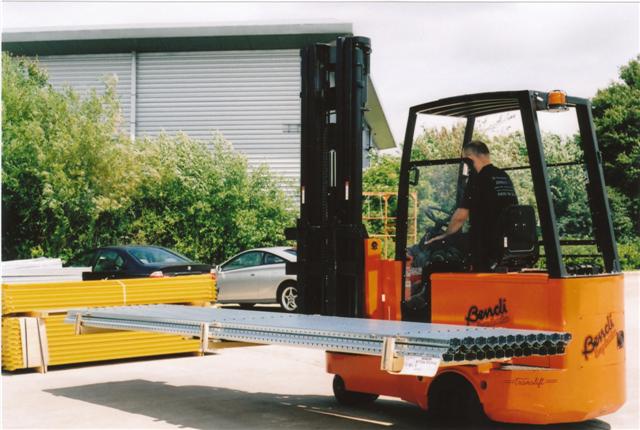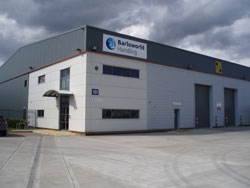 London's Cannery Row financial hub. (PHOTO: SHUTTERSTOCK) |
Never in the history of the UK forklift industry has there been such a rapid and steep market fall of the kind predicted for this year. Until last autumn, the UK market held up well, with sales little changed on 2007. This year, however, the British Industrial Truck Association (BITA), whose members account for 94% of all UK forklift sales (not rental), forecasts unprecedented falls in shipments and orders across all classes of industrial trucks. If correct, these will see counterbalanced truck sales down 47.4%, electric rider warehouse trucks off by 49.5% and pedestrian electric warehouse trucks down 42.6%.
Some BITA members may think these predictions are overly pessimistic as they already see signs of normal sales volumes for March, April and May. These include Translift Bendi and Nexen, while Linde, Britain's largest forklift supplier, increased its market share in 2008, which has continued into this year. Hubtex, best known for its sideloaders, also believes that "there are still some great areas of opportunity". Nexen, which will be launching its new "X" range of IC trucks this year, is confident enough to "achieve our goals for this year", says Pamela Oakes, sales director. Orders at some niche suppliers, like Translift Bendi, are also not so badly affected because, says MD Simon Brown, "people who know of articulated trucks realise the savings they can make from reduced storage, on- or off-site".
The forklift manufacturers' reaction to this unprecedented market turmoil has been predictable, often involving staff redundancies and cuts in overheads, but they are also striving to offer better value through product innovations and easier acquisition terms. They may, however, need to do more to survive the market turmoil by, for example, squeezing more costs out of their supply chains.
 Hubtex sideshifter |
Despite poor market conditions, there is, as yet, no sign that forklift manufacturers are sacrificing their efforts to bring new models on this year which will make life financially easier for their buyers. Nexen's "X" range, for example, is based on the company's service history, which means the truck will be designed to be "the easiest and lowest cost-to-maintain fork truck in the marketplace today", claims Nexen.
Linde is taking a similar route to axing user costs. For many years, it has been in the forefront of delivering incremental benefits through new, enhanced trucks and supporting initiatives, and this year is no exception. In January, for example, the UK saw Linde introduce a new range of electric pedestrian pallet trucks designed around the concept of "Sinergo" (safety, innovation and ergonomics). Not only do they raise overall productivity and safety levels but they also reduce energy consumption. Last year, it launched its 5- to 8-tonne diesel and LPG trucks whose major service intervals have been extended from 500 hours to 1,000 hours, thus improving uptime and reducing lifetime costs.
Suppliers must do moreForklift suppliers need to do more to help their customers, especially by way of easier acquisition terms, according to observers. To some extent, there are signs that this is already happening. Although considered abhorrent for risky financial reasons, the practice of inserting one-year break clauses in five-year rental deals is becoming more common. Briggs, for example, has introduced its own version of one-year break clauses and BITA concedes that "in order to survive during these difficult times, suppliers have a right to respond to the requirements of the market by offering innovative solutions".
 A Bendi forklift |
Barloworld's way of dealing with the downturn is to prioritise efforts to focus on activities that directly benefit service and support for its customers. Roger Massey, marketing projects manager for Barloworld Handling, says: "We have streamlined processes and improved efficiency, ensuring that customers receive the best level of services. Six Sigma project teams have been employed and we have made investments in key infrastructure such as a national used equipment centre in Tamworth."
Suppliers also need to look at their own supply chain costs because currency fluctuations are making life difficult for Euro-based suppliers, who account for most forklifts sold in Britain. This strained market is unique in that, despite savage falls in demand, forklift prices have risen, explains David Cooper, MD of Cooper Specialist Handling, owing to the 25% appreciation of the Euro against Sterling.
What buyers can do On the buyers' side, there is much that they can do to take costs out of their materials handling. It is still probably true that many own-account operators often have no real idea of their costs because forklift lifetime costs remain hidden. Many operators try to solve this by outsourcing the servicing of the forklifts. This has the benefit of cost certainty but perceived wisdom suggests that surrendering servicing to outside parties adds at least 50% to costs compared with an in-house operation, provided such an operation is highly efficient. But there seems to be a reluctance to move back to in-house servicing because rental/lease acquisitions, which usually involve a full-service contract, account for 70% of the forklift market and are growing. Outright purchase is favoured by small companies.
Buyers could also benefit from taking a fresh look at their forklift operations as they may be using far more trucks than they need. In this, they should consider using an independent consultant whose knowledge extends beyond forklifts to include materials handling techniques as they may not get the best advice from truck suppliers, especially if they are dealers only.
 One of Barloworld's UK facilities |
As an example of this, a Midlands manufacturer of robots was advised by one dealer he would need a fleet of 24 new trucks. But by considering a mixed fleet, including articulated forklifts, he was able to cope with the same work load on just 16 forklifts. Another example was when Cooper Specialised Handling was able to secure a large sideloader contract where fleet size reduction was a major factor in the decision. Here, the fleet size was cut from 50 sideloaders to 30.
Buyers should also compare performance rates of competing trucks under test conditions because, while all trucks may look similar, their performance rates may vary by up to 30%.
Many end-users will be aware of the substantial savings to be made from using versatile, articulated forklifts because of their impact on interface costs like rent, rates and energy costs but they may not be so familiar with the high residual values of such trucks at the end of their five-year hire period. A forklift's ability to retain a good second- and third-life value is beneficial to users looking to renegotiate the most cost-efficient lease terms and also helps distributors if they can market a product that holds its value. John Maguire, sales director of Narrow Aisle, which makes the Flexi, says that typically a refurbished Flexi will sell for about 65% of its price when new.
Growing sales of refurbished and remanufactured forklifts are probably the most obvious trend to emerge in this market downturn. Hubtex reports that second-hand forklifts are in more demand and they have been asked to extend some contracts. BITA confirms this, saying that there is evidence of roll-over of five-year contracts and using short-term rental machines for expansion until more certainty materialises. Translift Bendi reports that even blue chip companies see the benefit of buying their remanufactured and refurbished machines. A totally remanufactured forklift, which uses just the old chassis, is 20% cheaper than new forklifts.
The impact from damage and accident costs should also be addressed. BITA stresses that in a downturn it is crucial to avoid unplanned and unnecessary expenditure. One often overlooked aspect here is the risk of damaging litigation arising from insufficient attention to health and safety. Linde has developed a useful tool for this. By working with customers to monitor costs from accumulated damage, it will identify causes and find solutions to improve control.
Responses to growing environmental regulations will also favour forklift users. These largely revolve around energy issues. Linde, for example, is investing in the development of alternative drive technologies that save fuel. This includes start-stop automatic drives which capitalise on the fact that forklifts are, on average, idle for about 30% of their operating time. The future, though, believes Linde, seems to belong to hydrogen, though some would argue that if the problems of lithium-ion batteries can be solved, which is likely to be soon, there will be no need for hydrogen power. Linde has already shown forklifts with internal combustion engines running on pure, pollution-free hydrogen.
Future prospectsLooking to the future, BITA's most recent economic forecast claims that there will be moderate growth for the industry next year and a stronger rebound "could occur in 2011 as the economic recovery gathers pace". The problem with economic forecasts, however, is that they cannot grapple with immeasurable forces.
Two such immeasurable forces are the consumer fear factor and the reaction of global corporations to the downturn. No amount of cheap credit and fiscal easing will make much difference if consumers remain fearful of their job security.
The global corporations' reaction could have an even more damaging impact on forklift demand. They have been so badly hit that they are now reassessing their supply chains. Sony, for example, is to shrink its supplier network by half over the next two years - from 2,500 suppliers to 1,200 - to cut at least USD5.3 billion in costs. The plan will allow it to buy in higher volumes from its remaining parts suppliers at lower costs. Nissan did a similar purge 10 years ago and it helped turn the ailing car maker around.
If many other global corporations act similarly, then it will savage forklift demand. When the dust has settled, however, industry should emerge much more efficient, including the major forklift producers. Meanwhile, however, many independent forklift dealers, whose business models are weak and their balancesheets stretched, will collapse, stressing the importance of choosing sound partners.